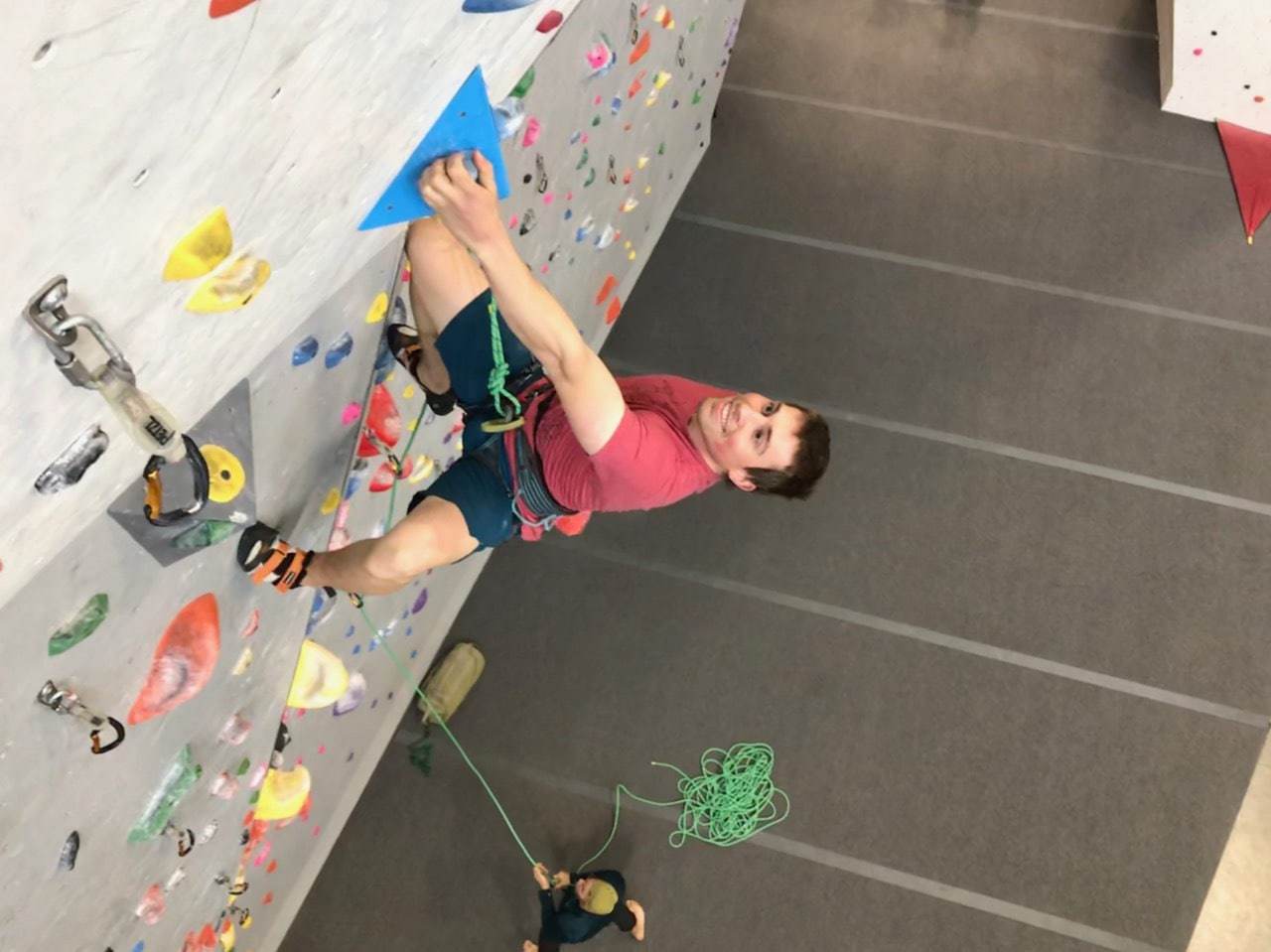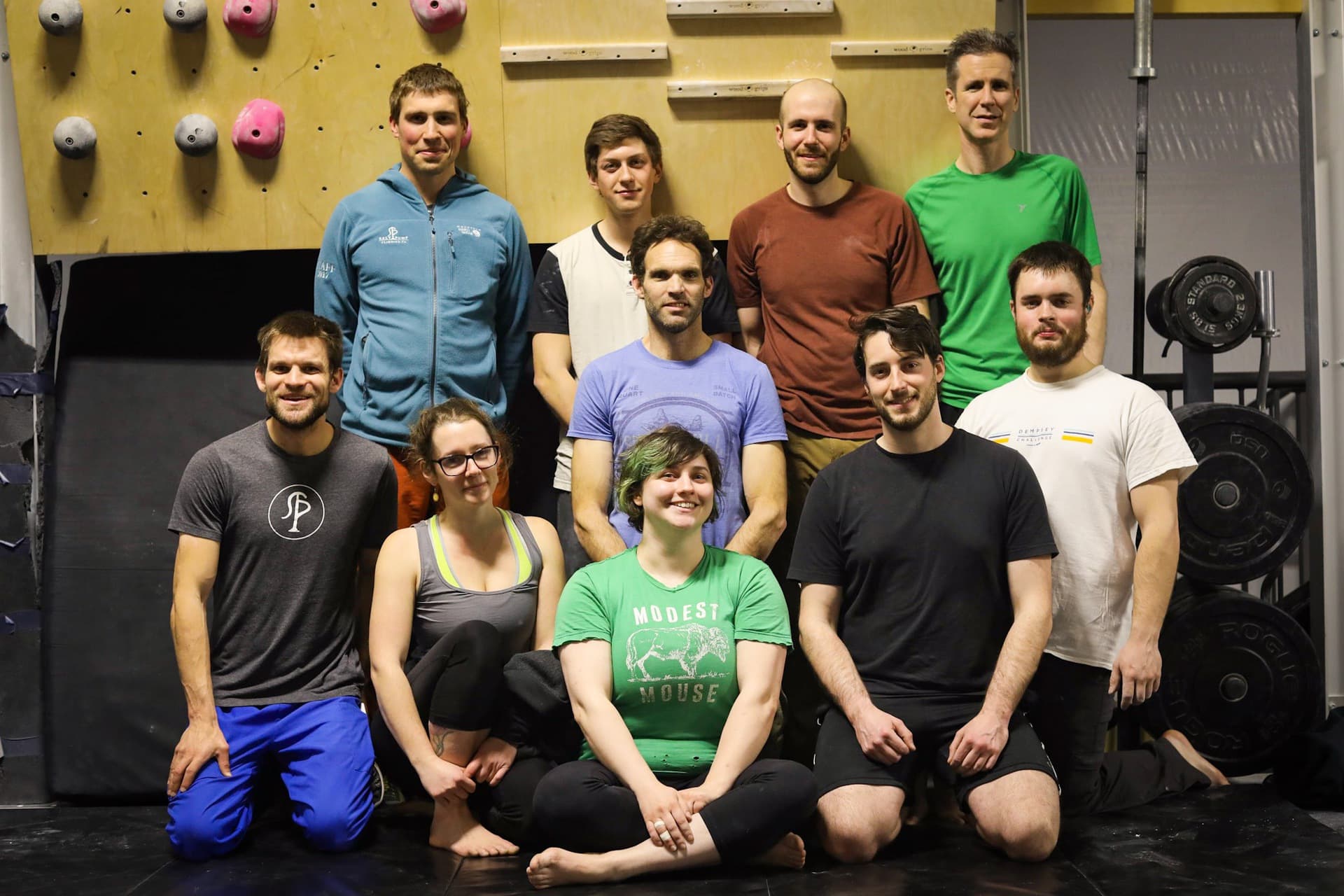Coaching Adult Team: A Final Gladness, Part I

Note: In August, long-time coach and guide Zack Sawyer will be moving on from Salt Pump and New England as he pursues new adventures with his partner Suzy in the desert of southern California. Zack joined the Salt Pump team soon after we opened, and his positive attitude, lust for learning, and quirky good wit quickly became part of our D.N.A. We wish him the best of luck on the next phase of his climbing journey – and look forward to following his trajectory as he will no doubt continue to excel in his chosen field. In this blog, he reflects on the practice structure and philosophies that are the foundation of the Adult Team.
It has been both a privilege and adventure helping coach Salt Pump’s adult team these past few years. I have learned much from my fellow dedicated coaches, and the earnest, thoughtful, and motivated Salt Pumper’s who have participated. Adult Team’s continued evolution reflects this mutual learning, and the program exists today in its best form yet. Amidst my final season, I wanted to take stock of it all, and share some of the lessons, philosophies, and people who have enriched my experience.
What is Adult Team?
Adult Team is a weekly class that looks holistically at each participant’s broader climbing development. We explore the sport’s movement, physical, and tactical components. Adult Team consists of a class group session, as well as a homework session to be completed during the week. Additionally, there are brief video or reading assignments, and other resources for those with time and interest.
Each class itself is broken into 4 components:
- Daily Nugget: A brief discussion on some facet of improvement. Topics include motor-learning, growth mindset, methods of improving strength & endurance, clipping, resting, on-sighting, and more.
- Technique Lesson & Practice: A discussion, followed by group practice covering different climbing techniques and movement skills.
- Climbing Session: A structured group climbing session focusing on different climbing-specific fitness components (endurance, strength, power, etc). That said, movement learning is always the priority.
- Training Session: A discussion and practice in the fitness area. We learn new exercises, refine form, and improve the team’s training knowledge.
Because of participants continued interest, this past winter we created a Season 2, open to those who had already undergone the traditional Season 1. Season 2’s main premise is to skillfully apply and put into practice the first season’s content. It also aims to teach participants how to design, implement, and progress their own plan for improvement. To summarize, the first season provides the breadth, the following seasons, the depth.
Philosophy
Not to overuse trite aphorisms, but the more I learn, the less I feel I know. Much of what I thought was established fact has evolved with added nuance, and others have changed completely. I have to sometimes remind myself that this is called learning! That said, there are certain tenets that I have only become more assured of, and it is these which forms much of the Adult Team philosophy. Here is a sampling.
Punch the clock—little and often over the long haul
For younger climbers, it can be difficult to look at one’s climbing career rather than the upcoming season and all the rad projects it contains. Adults have no choice. We believe that consistency always trumps intensity and that the choices we make have to be assessed against the injury risks. The workouts might not be Instagram worthy, but it is this sustainable consistency that enables periods of planned intensity. When I first started climbing I thought hard sessions and exhausting workouts was the name of the game. Today, I am convinced that not getting sick or injured is far more important. Aim to keep your climbing and training as simple as you can, for as long as you can. The more prescriptive our training, the harder it is to follow. An elite athlete requires more complexity, most of us don’t.
Practice makes permanent
Only perfect practice creates a perfect skill. Ironically, effective practice sessions involve being pushed to the edge of our abilities where we are free to make mistakes in order to learn from them. Where we tend to go wrong is when we unintentionally, ingrain these mistakes through many, mindless repetitions. Even worse, it’s a knife which cuts twice. Not only do we get worse at climbing, but repeating bad movement patterns, especially under increased difficulty, tends to create injury.
The solution? Treat the climbing sessions as a practice rather than a workout. The workout mentality can be destructive as high fatigue often comes at the expense of skill. Climbing is a skill-based sport, and we want to treat it as such. In Adult Team, we use technical, rather than absolute failure as our metric for when to end our sessions.
Eat your vegetables
No, not just the broccoli! We often joke that the vegetable boulders are the ones we don’t like but are really good for us. This is the work your weakness idea. We all have finite time and a limited ability to adapt. By addressing the things which matter the most we have the greatest efficiency in getting to where we need to be. The trouble is, what got us here could be the very thing holding us back. This requires constantly reassessing, and acquiring an objective overview of our strengths and weaknesses. Focusing on the latter is a surefire way to not having any.
Don’t forget the goal
When training discrete fitness components off of the climbing wall, we want to remember what we are after. As fun as chasing the 1-9, a heavy deadlift, or Vrschikasana might be (I will stick with Shavasana, thank you very much), if it doesn’t transfer over to our climbing or make us more durable, and injury-resilient as athletes, there are probably better uses of our time. For maximum transferability from the weight room to the rock, a good general rule is to prioritize movement patterns over exercises isolating individual muscles. Additionally, exercises to balance out all the pulling and gripping we do, are highly encouraged!

